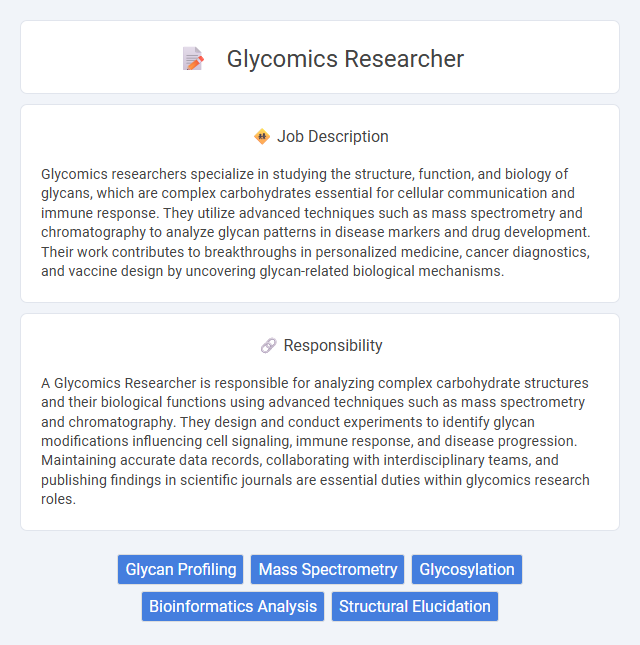
Glycomics researchers specialize in studying the structure, function, and biology of glycans, which are complex carbohydrates essential for cellular communication and immune response. They utilize advanced techniques such as mass spectrometry and chromatography to analyze glycan patterns in disease markers and drug development. Their work contributes to breakthroughs in personalized medicine, cancer diagnostics, and vaccine design by uncovering glycan-related biological mechanisms.
Candidates with strong analytical skills and a passion for biochemistry are likely to be well-suited for a Glycomics Researcher role. Individuals who enjoy working with complex data sets and have a background in molecular biology or chemistry will probably find this job fulfilling. Those who prefer routine tasks or lack interest in detailed scientific investigation might not be ideal fits for this position.
Qualification
A Glycomics Researcher typically holds a Ph.D. in biochemistry, molecular biology, or a related field with specialized knowledge in carbohydrate chemistry and glycan analysis. Expertise in mass spectrometry, chromatography, and bioinformatics tools for glycan profiling is essential for accurate structural characterization and functional studies. Strong analytical skills and experience in experimental design and data interpretation are critical for advancing glycomics research in biomedical applications.
Responsibility
A Glycomics Researcher is responsible for analyzing complex carbohydrate structures and their biological functions using advanced techniques such as mass spectrometry and chromatography. They design and conduct experiments to identify glycan modifications influencing cell signaling, immune response, and disease progression. Maintaining accurate data records, collaborating with interdisciplinary teams, and publishing findings in scientific journals are essential duties within glycomics research roles.
Benefit
Glycomics researchers likely gain significant benefits from contributing to cutting-edge scientific discoveries in the field of carbohydrate biology. They may also experience opportunities for collaboration with interdisciplinary teams and access to advanced laboratory technologies. Career advancement potential and competitive compensation are probable advantages in this specialized research area.
Challenge
Glycomics researchers likely face challenges related to the complexity and diversity of glycan structures, making their analysis and interpretation difficult. The probability of encountering technical limitations in glycan sequencing and the integration of multi-omics data increases the demand for innovative analytical methods. Overcoming these obstacles is crucial for advancing understanding of glycan functions and their roles in health and disease.
Career Advancement
Glycomics researchers explore complex carbohydrate structures to advance understanding of cellular communication and disease mechanisms. Mastery in techniques such as mass spectrometry and bioinformatics propels career growth within academic institutions, biotech firms, and pharmaceutical companies. Progression often leads to roles including lead scientist, project manager, or principal investigator, emphasizing the development of innovative therapeutics and diagnostic tools.
Key Terms
Glycan Profiling
Glycomics researchers specialize in glycan profiling to analyze complex carbohydrate structures and their roles in biological systems. Advanced mass spectrometry and chromatography techniques enable precise characterization of glycans, facilitating insights into disease biomarkers and therapeutic targets. Expertise in bioinformatics tools is essential to interpret glycan data and accelerate drug development processes.
Mass Spectrometry
Glycomics researchers specializing in mass spectrometry utilize advanced analytical techniques to identify and characterize complex carbohydrate structures in biological samples. Mass spectrometry enables precise profiling of glycan compositions, linkages, and modifications critical for understanding disease biomarkers and therapeutic targets. Expertise in tandem mass spectrometry (MS/MS) and high-resolution instruments is essential for accurate glycan sequencing and structural elucidation.
Glycosylation
Glycomics researchers specialize in analyzing glycosylation patterns to understand the structural and functional roles of glycans in biological systems. Their work involves utilizing mass spectrometry, chromatography, and bioinformatics tools to map glycan modifications on proteins and lipids, which is crucial for drug development, disease diagnostics, and biomarker discovery. Expertise in enzymatic synthesis and glycoengineering enhances the ability to manipulate glycosylation for therapeutic applications and personalized medicine.
Bioinformatics Analysis
Glycomics researchers specializing in bioinformatics analysis utilize computational tools to decode complex carbohydrate structures and their biological functions, enhancing understanding of glycan diversity and interactions. They analyze large-scale glycan datasets through algorithms and machine learning to identify patterns linked to diseases, such as cancer and autoimmune disorders. Proficiency in databases like GlyTouCan and software for glycan structure prediction is essential for advancing glycomic biomarker discovery and therapeutic development.
Structural Elucidation
Glycomics researchers specializing in structural elucidation utilize advanced techniques such as mass spectrometry, nuclear magnetic resonance (NMR) spectroscopy, and chromatography to decode complex glycan architectures. Detailed analysis of glycan branching patterns, linkage types, and monosaccharide compositions is essential for understanding biological functions and disease mechanisms. Expertise in bioinformatics tools for glycan data interpretation enhances the accuracy of structural assignments and accelerates discoveries in glyco-biology.
 kuljobs.com
kuljobs.com